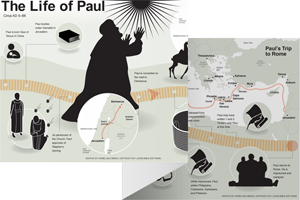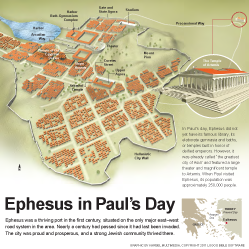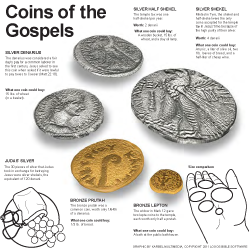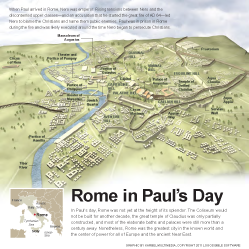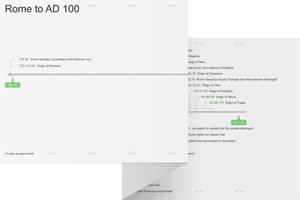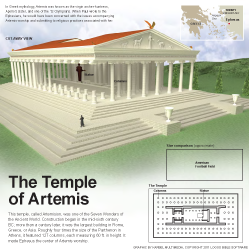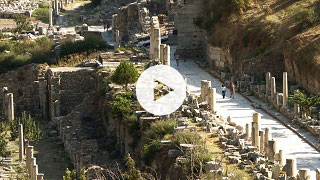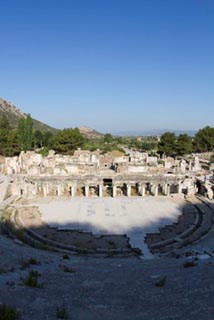19:1–10 During Paul’s third missionary journey (circa ad 52–57; 18:23; 19:1–21:26), he returns to Ephesus, where he stopped briefly on his second missionary journey (circa ad 49–51; 18:19–21). This time, he stays in the city for about three years (vv. 10; 20:31). |
Event | Approximate Date |
Paul’s first missionary journey (13:1–14:28) | ad 46–47 |
Paul’s second missionary journey (15:40–18:22) | ad 49–51 |
Paul’s third missionary journey (19:1–21:26) | ad 52–57 |
19:1 while Apollos was in Corinth Compare 1 Cor 1:12–13; 3:4–6.
disciples While this term usually refers to followers of Jesus, these people were likely originally followers of John the Baptist, since they had received his baptism (Acts 19:3).
19:6 speak in tongues This is likely a reference to an act related to worship (see note on 10:46), not miraculously speaking in another person’s native language (compare 2:4–6). In Acts, speaking in tongues is related to the Holy Spirit indwelling and empowering believers (2:4–6; 10:45–46).
19:7 about twelve Refers to John’s disciples. This may parallel the twelve apostles.
19:8 kingdom of God See note on 1:3.
19:9 lecture hall of Tyrannus Probably a lecture hall or school building. Tyrannus either owned this hall or was its major teacher.
19:10 for two years Paul’s lengthy stay in Ephesus allowed him to use the city as his base of ministry operations for his third missionary journey (compare 18:11).
all who lived in Asia Because Ephesus is a key city for travel and business, it allowed Paul’s testimony of Jesus to spread throughout the Roman province of Asia (a region on the west coast of modern-day Turkey; see 16:6 and note). People visiting Ephesus had the opportunity to hear Paul preach the gospel, and those who believed would have then spread the message to the various places they visited and lived.
19:11–20 Paul continues his work in Ephesus to establish it as a base location for his missionary work. This narrative is primarily concerned with Jesus’ true power versus the counterfeit authority of other exorcists. |
 Miracles in Acts Table
Miracles in Acts Table
19:12 handkerchiefs or work aprons that had touched his skin This evokes the story of a woman being healed by merely touching Jesus (see Luke 8:43–48), showing that the power of the Holy Spirit continues the work of Jesus in the life of Paul.
19:13 Jewish exorcists Exorcising, or driving out evil spirits, seems to have been widely practiced by Jews in the first-century ad.
name of the Lord Jesus Within parts of Graeco-Roman culture and Judaism in the first-century ad, it was believed that evoking a particular incantation or name granted special power to the person evoking it. In this case, the exorcists attempted to copy Paul’s use of the name of Jesus to drive out evil spirits.
19:14 Sceva, a Jewish chief priest The book of Acts is the only source to mention this person.
19:15 I know The man (or the demons that possessed him) demonstrates awareness of both Jesus and Paul.
who are you Even the evil spirit recognizes the unique authority of Jesus’ name. Because the sons of Sceva were not servants of the true God, the evil spirit essentially proclaims that they are illegitimately using Jesus’ name.
19:16 subdued The possessed man is able to overpower the sons of Sceva; they were not able to use the name of Jesus because they lacked genuine faith in Him. Compare Matt 7:22–23.
naked and wounded The fraudulent claims of the sons of Sceva leave them humiliated. Instead of casting out the evil spirit from the man, the sons of Sceva are driven out of the house.
19:18–19 It is unclear whether the people described here were formerly mixing Christianity with pagan religion or if they had only chosen to believe in Jesus following the event with the sons of Sceva. |
19:19 fifty thousand silver coins The Greek text here could refer to drachmas or to denarii, two different kinds of silver coins. They were both a worker’s daily wage, so this amount would equal approximately 135 years’ worth of wages.
19:20 was prevailing Through their dramatic actions, the believers demonstrate the gospel’s influence in every area of their lives. Their actions testify to their joyful submission to Jesus and to the power of Jesus over evil powers.
19:21–41 Paul’s time in Ephesus ends with a riot, which ironically displays the dramatic impact of God’s work through the gospel in the city. |
19:21 Jerusalem The completion of Paul’s work in Ephesus shows how Christ has established the essential framework to minister to both Jews and Gentiles (non-Jewish people) from Jerusalem to the ends of the earth (Acts 1:8).
Rome Paul’s aim is to journey to the center of the Roman Empire to testify to the good news of Jesus and demonstrate that the gospel cannot be hindered.
19:22 Timothy See 16:1; 1 Tim 1:2 and note.
Erastus The name Erastus occurs two other times in the nt (Rom 16:23; 2 Tim 4:20). Because Erastus was a common name at the time, it is difficult to determine if the person mentioned here should be identified with the other references to Erastus.
19:24 Artemis Refers to a local representation of the Greek goddess of the moon, who was called Diana by the Romans. Artemis was the patron deity of Ephesus.
19:25 this business Demetrius appeals to the livelihood of the Ephesian artisans to incite them against Paul.
19:26 gods Paul has established the folly of worshiping created objects, since the only true God is the Creator, Yahweh (Acts 17:16–34), and gods created by people are false. Compare 1 Cor 8:4–6.
19:27 temple of the great goddess The city took great pride in the temple. For it to be discredited would be an enormous insult to the city and to its economic detriment. Compare note on Acts 19:24.
19:28 they began to shout Having heard that their city could fall into disrepute, the people are rallying to protect the honor of the city and attack those who oppose it.
Artemis of the Ephesians While Artemis was worshiped all over the Graeco-Roman world, the Ephesians took pride in the temple dedicated to her in their city. Artemis was the patron god of the city.
19:29 the theater This structure was cut into the side of Mount Pion and faced west, toward the harbor. The preserved remains indicate that it could seat around 24,000. Since it was expanded over the course of the first century, the capacity may have been somewhat smaller in Paul’s day.
Gaius A travel companion of Paul. He is most likely not the same Gaius mentioned in 20:4 since Luke describes the two men as coming from two different places.
Aristarchus A travel companion of Paul who was from Thessalonica (20:4). Paul seems to refer to this same Aristarchus in his letters (Col 4:10; Phlm 24).
19:31 Asiarchs The upper-class civic rulers who were in charge of the administration of Ephesus. Their insight and reaction into the circumstances demonstrate the serious nature of the riot caused by Demetrius.
friends Paul’s message affected every tier of society.
19:33 Alexander A Jew who is otherwise unmentioned in the nt. Acts does not mention whether Alexander was a Christian.
19:34 a Jew The crowd, already confused, would have reacted strongly to Alexander’s ethnicity. Jews would have refused to worship Artemis on account of their exclusive worship of Yahweh.
19:35–40 The city secretary (or clerk) speaks in a rhetorical pattern commonly used in Graeco-Roman society of the first-century ad. He begins with a review, which he follows with his thesis (Acts 19:35, 36). He then presents an argument to support his main idea before ending with an appeal to the audience to act appropriately (vv. 37–39, 40). |
19:35 the city secretary The chief executive of the city. The clerk manages the records and accounts for a Roman city and is the representative between the city and Rome.
fallen from heaven Refers to the Greek mythology that Artemis’ stone fell from the sky. This image likely refers to a meteorite fallen from the sky and is intended to highlight Artemis’ divine origin.
19:36 quiet The main point of the secretary (or clerk) is that if the audience acts consistently with their beliefs, they would maintain the civic peace. If Artemis worship is so strong and powerful, then she has no need for the crowd to act on her behalf.
19:40 rioting Roman officials would consider rioting an act of rebellion and would take military steps to resolve the situation, resulting in violence and loss of life; in addition, they would likely strip Ephesus of certain privileges and rights, especially of self-governance.

|
About Faithlife Study BibleFaithlife Study Bible (FSB) is your guide to the ancient world of the Old and New Testaments, with study notes and articles that draw from a wide range of academic research. FSB helps you learn how to think about interpretation methods and issues so that you can gain a deeper understanding of the text. |
| Copyright |
Copyright 2012 Logos Bible Software. |
| Support Info | fsb |
 Loading…
Loading…
